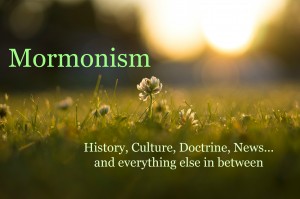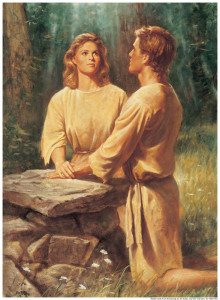When I was looking for churches to investigate, I noticed that many of the people I talked to treated their religions more like traditions than a way of life. They attended a worship service and then left the building to head straight back into their ordinary lives. That wasn’t what I was looking for. One day, after having visited a friend’s church at age fifteen, my mother asked me what I was looking for in a church. Although I had a list of doctrines in my room, I wasn’t focusing on that as the first step. I explained, “When I walk out of the church building, I want to be different than I was when I walked in.” I wanted that first; then I could look into doctrine. I felt that if a religion couldn’t change me into more than I was now, it wasn’t worth giving my life to, and I knew I was the sort of person who would give my life wholeheartedly to whatever faith I eventually chose.
 The Church of Jesus Christ of Latter-day Saints—the religion many refer to informally as Mormonism—did that for me. I saw that its members, even the other teenagers I met, considered their faith to be a way of life, not a minor tradition in their busy lives. They used their faith to help select their values. They prayed often, they talked about God and Jesus Christ as if they knew Them well and loved Them. They made church activities a major part of their lives, even though they were also very involved in their public school, community, and family lives. For me, that was a first step. I knew it was an around-the-clock and across-the-calendar religion. At that point, I was ready to begin investigating the doctrine.
The Church of Jesus Christ of Latter-day Saints—the religion many refer to informally as Mormonism—did that for me. I saw that its members, even the other teenagers I met, considered their faith to be a way of life, not a minor tradition in their busy lives. They used their faith to help select their values. They prayed often, they talked about God and Jesus Christ as if they knew Them well and loved Them. They made church activities a major part of their lives, even though they were also very involved in their public school, community, and family lives. For me, that was a first step. I knew it was an around-the-clock and across-the-calendar religion. At that point, I was ready to begin investigating the doctrine.
Why Does Mormonism Ask so Much of its Members?
Mormons don’t just see religion as a nice tradition or a way to feel good for a few hours each week. For them, it is a way of life—of eternal life. We believe we are here on Earth for a variety of essential reasons, one of which is to find God and His gospel. Then, having found it and having had it confirmed by God personally through prayer, we are to spend our lives on Earth preparing for our eternal lives. This means working to make ourselves worthy to live in the presence of our perfect Heavenly Father. This  makes sense, of course. When we get to Heaven, we will be ourselves, and I don’t think many of us would consider it Heaven to be surrounded by people who thrive on immorality. We need to become the kind of person who fits into God’s personal kingdom. We do this not for a prize, but because we love God and Jesus Christ with all our hearts and want to be with Them forever. We want them to be proud of the person we are becoming. We want to become the people God and Jesus know we can become.
makes sense, of course. When we get to Heaven, we will be ourselves, and I don’t think many of us would consider it Heaven to be surrounded by people who thrive on immorality. We need to become the kind of person who fits into God’s personal kingdom. We do this not for a prize, but because we love God and Jesus Christ with all our hearts and want to be with Them forever. We want them to be proud of the person we are becoming. We want to become the people God and Jesus know we can become.
Mormons love to study the scriptures, including the Bible and the Book of Mormon, to find out who God wants us to be and how He wants us to live. We study the life of Jesus Christ to learn how to model ourselves after Him. Many people work to become more like their heroes; Jesus is the hero Mormons want to emulate. Becoming like Jesus is a life-time project and it takes much of our time.
In the World, But not of it
Mormons are taught to be in the world, but not of it. This means we don’t live in isolated communities all alone, away from the world. We live in ordinary neighborhoods—there may even be one in your own neighborhood. We send our children to public schools or we homeschool. Some go to private schools, but the Mormons don’t have their own schools in most places that are meant for students younger than college age. We are employed in ordinary work places. Our children join community sports leagues and clubs. We volunteer in our communities. We are a lot like everyone else.
However, we do have our faith and our faith sometimes makes us stand out a little. We are taught to dress modestly. This doesn’t mean you’ll be able to identify a Mormon by unusually modest clothing. Mormons dress like everyone else, but they—both the men and the women—wear clothing that does not show cleavage, bare midriffs, bare backs, or too much leg. Most Mormons wear shorts and dresses at least to the knee. They like to let people know their value is internal, not shallowly external—and yet they still dress nicely.
have our faith and our faith sometimes makes us stand out a little. We are taught to dress modestly. This doesn’t mean you’ll be able to identify a Mormon by unusually modest clothing. Mormons dress like everyone else, but they—both the men and the women—wear clothing that does not show cleavage, bare midriffs, bare backs, or too much leg. Most Mormons wear shorts and dresses at least to the knee. They like to let people know their value is internal, not shallowly external—and yet they still dress nicely.
Mormons are taught not to swear, drink, use drugs, or smoke. They try to keep the Sabbath day holy, which includes not doing commercial events on Sundays. They read their scriptures regularly, serve others, and try to focus on eternal goals. Their clean-cut morality often wins them praise from others,who note that these values have real advantages. Statistically, they have lower divorce rates, particularly if they were married in a Mormon temple, they spend more time as a family, and they tend to stay out of serious trouble. They aren’t perfect, but overall, Mormons tend to demonstrate the advantages of old-fashioned values.
Having old-fashioned values, though, doesn’t mean they are outdated. They use technology (obviously, since this article is appearing on the Internet), take advantage of modern medicine, and enjoy the privileges of the modern world, as long as that moderness wouldn’t keep them from being more Christlike. They focus not on what is fashionable, cool, or popular today, but on the unchanging eternal values of God.
Mormonism was never meant to be a light, casual, no-impact religion. We learn in the Book of Mormon that we were created to be joyful, and Mormons believe that God’s way is the joyful way, so we are Mormon and Christian all day, every day.
About Terrie Lynn Bittner
The late Terrie Lynn Bittner—beloved wife, mother, grandmother, and friend—was the author of two homeschooling books and numerous articles, including several that appeared in Latter-day Saint magazines. She became a member of the Church at the age of 17 and began sharing her faith online in 1992.






